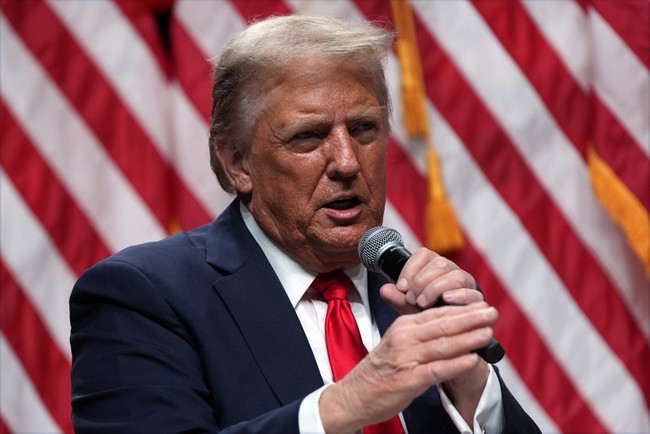We support our Publishers and Content Creators. You can view this story on their website by CLICKING HERE.

So says the Times of London, and no one should be surprised to hear it. Donald Trump disqualified transgender recruits during his presidency and then campaigned on the issue of runaway wokeness at the Department of Defense. Trump also nominated Pete Hegseth as Defense Secretary, after Hegseth wrote a book laying out how to boost recruitment with a more muscular focus on the actual military mission.
Advertisement
The Times reports that this will be a Day One order:
Donald Trump is planning an executive order that would lead to the removal of all transgender members of the US military, defence sources say.
The order could come on his first day back in the White House, January 20. There are believed to be about 15,000 active service personnel who are transgender. They would be medically discharged, which would determine that they were unfit to serve.
It would also lead to a ban on trans people joining the military and would come at a time when almost all branches of the American armed forces are failing to meet recruitment targets.
We’ll get back to recruitment concerns in a moment. The questions raised in the immediate sense have to do with legality and force readiness. Regardless of whether Trump would have allowed their recruitment at the time, the current transgender members of the services signed up legally and have met their terms of service, so to speak. Trump could declare them medically unfit to serve if this condition has interfered with their individual performances, but that might not work in a blanket policy for discharge. At the very least, we can expect several years of litigation over the point.
Force readiness is another concern, although there’s more than one aspect to that issue. Removing 15,000 active-duty service members in one fell swoop, spread out across the various branches and units, will create some chaos and gaps in performances, at least for the short term while the Pentagon reorganizes those units and tasks. Regardless of the merits of this decision, this will impact overall readiness for some period of time.
Advertisement
Of course, force readiness has different meanings. Trump wants to excise the “wokeness” out of the military, and the transgender contingent is the obvious first step in shifting focus from social justice to a purely military mission. Hegseth wrote a book detailing the steps necessary to reform the military through focus on lethality and excellence rather than identity politics and celebrations of “diversity.” Hegseth also argued in his book that the Pentagon’s recruiting shortfalls are a direct result of the embrace of social-justice identity politics over the traditional military culture, the latter of which Hegseth and others believe remains powerfully attractive to potential recruits.
A military entirely focused on lethality and its traditional mission will achieve a far more effective state of readiness, Trump and Hegseth believe. And it can hit those achievements more quickly, even with a slightly smaller force, once all of the other distractions are removed.
It’s tough to take either the recruitment or force readiness arguments seriously in this case, though. We’re just a couple of years past the point in which Joe Biden kicked out over 8,000 active-duty military members for refusing a COVID-19 ‘vaccine’ on the basis that the refusal put others at risk for the spread of the virus. The same people raising alarms over the dislocation the rumored EO would create argued just the opposite at that time.
Advertisement
When the administration was finally forced to acknowledge that the ‘vaccine’ neither prevented the uptake nor the transmission of COVID-19 and had risks for its recipients, it was too late to convince them to return:
Only 43 of the more than 8,000 US service members who were discharged from the military for refusing to be vaccinated against Covid-19 have sought to rejoin eight months after the vaccine mandate was officially repealed, according to data provided by the military branches.
Many Republicans argued that the vaccine mandate hurt military recruiting and retention efforts, which was part of the rationale for forcing the Defense Department to cancel the vaccine requirement. The military mandated the vaccine between for only 15 months from August 2021 through January 2023, when it was rescinded by law as part of the National Defense Authorization Act. It marked perhaps the first time in US military history that a vaccine requirement was reversed.
But since the repeal, only 19 soldiers have rejoined the Army, while 12 have returned to the Marines, according to service spokespeople. The numbers are even smaller for the Air Force and Navy, where only one and two have rejoined, respectively, the services said.
At the time, the DoD claimed that they were hitting their retention targets in response to Republican arguments against the policy in the first place. Now, with this potential policy on the horizon, retention and recruitment are suddenly in crisis mode? Color me skeptical on this claim, but it’s worth noting that the Pentagon and defenders of its current woke policies are now acknowledging problems with both.
Advertisement
That leaves us with the legal issues surrounding the blanket discharge order, and the question of whether this should be oriented toward individual performance instead. But that debate arose during Trump’s first term too, and so no one should be surprised to have it again in this term.

 Conservative
Conservative  Search
Search Trending
Trending Current News
Current News 







